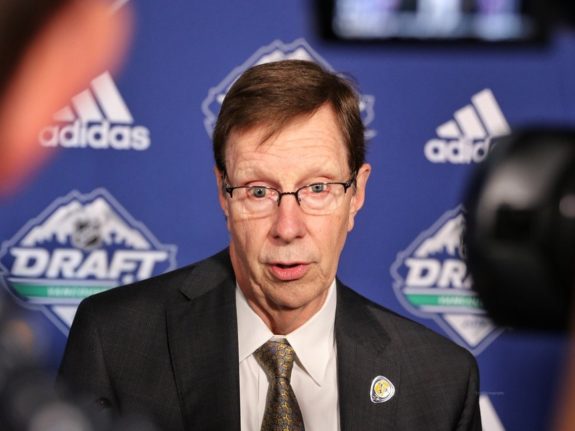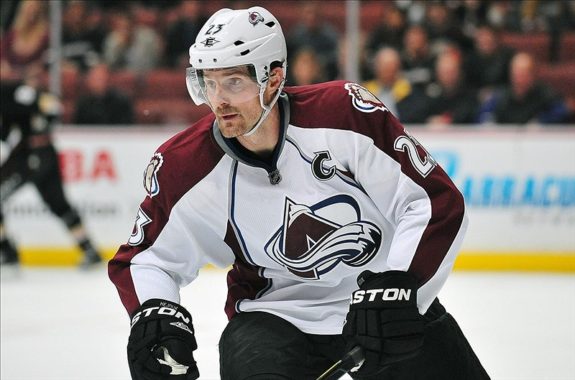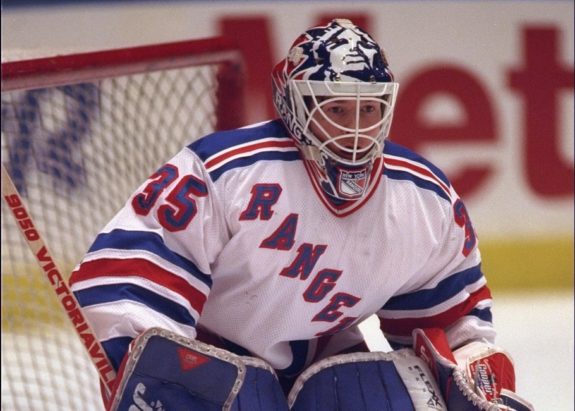On June 25, 1997, the NHL’s board of governors approved new teams for four cities in an ambitious plan to expand to 30 clubs within three years. (from ‘N.H.L. Names 4 Cities For Its New Franchises,’ New York Times, 06/18/1997) Nashville was the first to join for the 1998-99 season, followed by Atlanta the next year and both Minneapolis-St. Paul and Columbus in 2000-01.
The players available in the 1998 Expansion Draft show how exponentially harder it was for the Nashville Predators to assemble a team than it was for the Vegas Golden Knights in 2017. The same challenge awaited the Atlanta Thrashers, Minnesota Wild and Columbus Blue Jackets. They may as well have been playing hockey with brooms.
Related: All-Decade NHL Draft – 2010-to 2019
Teams were allowed to protect four more players than the format used for the Golden Knights and the upcoming Seattle Kraken. If they wanted to keep two goalies, they could still protect as many players as teams did in 2017. The dead puck era was underway and the league was littered with players for whom the word mediocre would be a compliment, so this was a colossal challenge for Predators general manager David Poile.

With the benefit of 22 years worth of hindsight, I’m going to redo Nashville’s expansion draft picks with an eye toward longevity, but also the ability to be competitive. The task is to pick one player from each of the 26 teams, including at least 3 goalies, 8 defensemen and 13 forwards. I’m not fishing for compensatory draft picks by targeting unrestricted free agents, and there will be no side deals to help teams keep decent players. Predators, after all, show no mercy.
Anaheim Mighty Ducks
The Mighty Ducks were only five years old, so their unprotected list was weak. The Predators went for 33-year-old goalie Mikhail Shtalenkov, who was out of the NHL two seasons later. My pick is 22-year-old forward Richard Park, the second Korean-born NHL player ever. Park became a regular in 2001-02 with Minnesota.
He went on to play nine full seasons with the Wild, Vancouver Canucks, New York Islanders and Pittsburgh Penguins, as a moderately productive third-liner and penalty-killer. He had a career-high 32 points with the Islanders in 2007-08 and reached double digits in goals six times.
Boston Bruins
The Bruins’ list was quite thin too, and Nashville selected future Penguins coach Mike Sullivan only to flip him for a seventh-round pick. I’m going to take enforcer Andre Roy, a left-winger who had a nine-season career with the Ottawa Senators, Tampa Bay Lightning, Penguins and Calgary Flames. Virtually every team was carrying one or more tough guys back then, and Roy fought his way to 1,169 penalty minutes in 515 games before his retirement in 2009. He also won the Stanley Cup with Tampa in 2004.
Buffalo Sabres
The Predators grabbed stay-at-home defenseman Bob Boughner from the Sabres, and he was a solid pick, playing another seven seasons in the league, including two in Nashville. But checking center Scott Nichol stuck around much longer, retiring in 2013 after filling a bottom-six role for the Flames, Chicago Blackhawks, Predators, San Jose Sharks and St. Louis Blues. He never posted more than 19 points in a season but would’ve seen more ice time on an expansion team.
Calgary Flames
Calgary’s unprotected list had a few solid options, including Nashville’s pick, defenseman Joel Bouchard and center Jim Dowd. But I’m zeroing in on goaltender Dwayne Roloson. At 29, he only had two NHL seasons under his belt, but he was headed for a long, stellar career highlighted by seven seasons as a starter for the Wild and Edmonton Oilers in the 2000s.

He led the Oilers to the 2006 Stanley Cup Final, but was sidelined by his own teammate in the series opener. He also had some good years with the Islanders and Lightning before retiring at age 42.
Carolina Hurricanes
Nashville selected journeyman winger Jeff Daniels from the Hurricanes, and he didn’t even make their roster the next season. A much more tantalizing pick would’ve been 23-year-old defenseman Marek Malik, a huge bruiser at 6-foot-5, 230 pounds who was playing in Sweden at the time. He spent 10 seasons playing a physical, shutdown brand of defense for the Hurricanes, Canucks, Rangers and Lightning. Oh, and he also scored an astonishing between-the-legs goal to end the longest shootout in NHL history in 2005.
Chicago Blackhawks
The Predators made a good pick from the Blackhawks, and I’m going to stick with it. Greg Johnson was about halfway through his career in 1998, having played five seasons with the Red Wings, Penguins and Blackhawks. The center had career highs of 18 goals and 40 points at the time, both in 1995-96. Johnson became a go-to offensive contributor and playmaker with the fledgling Predators, and their first season was the best of his career with 16 goals and 50 points in 68 games. He was a big part of their roster for seven seasons, topping 10 goals six times, and retired in 2006. Unfortunately, he died in 2019.
Colorado Avalanche
Nashville picked UFA Uwe Krupp from the Avalanche to get a compensatory draft pick. But lurking on the Avalanche list was a little-known 22-year-old winger playing in the Czech league named Milan Hejduk. The former fourth-round pick put up 48 points as a rookie in 1998-99, earning a Calder Trophy nomination. He spent the next 14 seasons in Denver terrorizing the league.

He scored 50 goals in 2002-03 to win the Rocket Richard Trophy, and scored at least 20 goals for 11 straight seasons. Hejduk was a huge part of the Avs’ Stanley Cup victory in 2001 with 23 playoff points. He retired in 2013 with totals of 375 goals and 805 points in 1,020 NHL games.
Dallas Stars
The Stars lost big enforcer Patrick Cote to the Predators. He posted 312 penalty minutes and three points in 91 games with them and was out of the NHL by 2001. A better choice would have been the other half of Minnesota’s long-time goalie tandem, Manny Fernandez. Aged 24, Fernandez went on to play parts of nine seasons, mostly platooning with Roloson in the Twin Cities. He posted a .929 save percentage in the 2003 playoffs to help the Wild make a shocking run to the conference final. Fernandez had a SV% of .920 or better three times. He finished his career with the Bruins in 2009.
Detroit Red Wings
Nashville chose 34-year-old winger Doug Brown from the two-time defending champion Red Wings. He had a solid career, but it was almost over. My pick is right-winger Mike Knuble, a big-time goal scorer who would play more than 1,000 games with the Rangers, Bruins, Flyers and Capitals.

Knuble broke the 30-goal mark twice and had another six seasons with more than 20. His best season came with the Flyers in 2005-06, scoring 34 goals and 65 points. He retired in 2013 with 278 goals and 270 assists.
Edmonton Oilers
It’s tough to find a good long-term option from the Oilers’ list. The Predators took Doug Friedman, who played exactly two games there. Let’s roll the dice on talented winger Andrei Kovalenko three years after he went to the Montreal Canadiens in the infamous Patrick Roy trade. He had the skill, scoring 68 points as a rookie with the Quebec Nordiques, and burying 32 goals for the Oilers in 1996-97.
He broke 25 goals two other times. But he never reached his potential and earned a ticket out of Edmonton in 1999 when he missed a flight after a night at the bars. Kovalenko played for six teams in six years, returning to Russia in 2001 after two solid seasons in Carolina and Boston.
Florida Panthers
The Panthers’ list didn’t offer much longevity either. Nashville’s pick, Chris Armstrong, played seven NHL games. Instead, I’ll grab some veteran leadership in Kirk Muller. At 32, he was several years removed from his glory days with the Habs and New Jersey Devils, but still had five seasons left in him with the Panthers and Stars. Certainly, he was good enough to play in the top-six on an expansion team.
Los Angeles Kings
The Kings exposed a few good defenders and sent the Predators Kimmo Timonen, then a prospect playing in Finland, to leave them alone. Defenders Jaroslav Modry and Philippe Boucher had good careers, but I’ll stick with Timonen, also exposed. He was Nashville’s first star player, who eventually became captain, and a three-time All-Star.

He eclipsed 40 points five times in eight seasons there, including a career-high 55 in 2006-07. Timonen then had seven strong seasons in Philly. He joined Chicago at the 2014-15 deadline, won the Stanley Cup and then retired. He had 571 points in 1,108 games.
Montreal Canadiens
The Preds’ best pick was Canadiens goalie prospect Tomas Vokoun, a ninth-rounder in the AHL. He’s a no-brainer. He platooned with Mike Dunham in a 1B role for a while, but by 2002-03 he’d emerged as a workhorse starter. The two-time All-Star gave the Predators a chance against more talented teams. Vokoun played eight seasons in Nashville, as many as 73 games per, with a .918 SV% or higher the last three. But he had his best years with Florida, finishing top five in SV% twice; it didn’t dip below .919 in four seasons. He also had brief stops in Washington and Pittsburgh.
New Jersey Devils
Nashville took Dunham from the Devils, but I’ve already got three good tenders. Let’s grab another veteran leader with some miles left in Dave Andreychuk. Even at 35, the future Hall of Famer had seven seasons left and topped 30 points in five, averaging nearly half a point a game. He’d improve those numbers in the Predators’ top six, although he wouldn’t have earned that long-awaited Cup in 2004.
New York Islanders
I’ve only got two defensemen, so let’s take Dick Tarnstrom from the Isles. The Predators chose J.J. Daigneault, Mr. Suitcase himself, who only played another two seasons. Tarnstrom, 23, would spend another three seasons in Sweden but had a decent NHL career when he came over, playing five seasons with the Islanders, Penguins, Oilers and Blue Jackets. Maybe a roster spot with the Predators would’ve lured him over sooner. His peak came with Pittsburgh from 2002-04 with 41 and 52 points, respectively.
New York Rangers
Nashville selected pending UFA Mike Richter from the Rangers to get a compensatory pick when he returned to NYC. But I’m taking another Swedish defense prospect in Kim Johnsson. The 22-year-old came over a year later, embarking on a 10-year career as an offensive rearguard.

He had two promising seasons with the Rangers before heading to Philly in the Eric Lindros trade. He had his most productive years there, with about 40 points in three straight seasons. He was a top-pairing player for the Wild for four seasons until he was dealt in 2010 to Chicago, where he suffered a career-ending concussion and missed out on winning a Cup.
Ottawa Senators
The Senators lost enforcer Denny Lambert to the Predators, but there are better options. Ron Tugnutt stands out, but the Preds are set in goal. Let’s go with 24-year-old defenseman Patrick Traverse, who would play five seasons with the Senators, Mighty Ducks, Bruins and Canadiens. He had a career-high 23 points in 1999-2000, then played for three different teams the next season. His last significant action was playing 65 games for Montreal in 2002-03, but he played in the AHL until 2009.
Philadelphia Flyers
The Flyers had perhaps the weakest unprotected list. Nashville took forward Craig Darby, he of only two full NHL seasons, but it’s hard to find a better choice. Still, the back end looks weak, so let’s grab Paul Coffey to sell some tickets. He’s our second Hall of Famer. The 37-year-old spent parts of three more seasons in the NHL.
The Flyers traded him to Chicago, but he played only 10 games there before they flipped him to Carolina. He managed 14 points in 54 games that year, then put up 11 goals and 40 points in 1999-2000. Coffey signed with Boston that summer, but played only 18 games before retiring.
Phoenix Coyotes
Pickings were slim from the Coyotes too, as half their exposed players were pending free agents. So Nashville’s pick, defenseman John Slaney, still makes sense. His career never really panned out, but he was an original Predator with 14 points in 46 games in their inaugural season. He then left for Pittsburgh and played just 34 more NHL games. Sure, he dominated the AHL, but probably would’ve seen more big-league action with the Preds.
Pittsburgh Penguins
From the Penguins, I’ll pass on goalie Jean-Sebastien Aubin to take Nashville’s actual pick, centre Tony Hrkac.

They immediately traded him, but the 32-year-old had a few productive seasons left with the Stars, Islanders, Mighty Ducks and Thrashers. He scored 18 goals and 44 points for Atlanta in 2001-02.
San Jose Sharks
Nashville picked the chronically injured Al Iafrate from the Sharks to get a pick. He’d already played his last NHL game. The Sharks exposed one player under contract who would play in the bigs again, defenseman Ken Sutton, who suited up for another 85 games with the Devils and Islanders. His last action was in 2001-02.
St. Louis Blues
The Predators’ pick from St. Louis was right-winger Blair Atcheynum, who had just broken into the league at age 28. He played parts of three more seasons but was a non-factor offensively. I’m going to take big veteran center Mike Eastwood, who was headed for his most productive years with the Blues. He scored 19 goals and 34 points in 1999-2000 but excelled in a checking role. His last season was with Pittsburgh in 2003-04.
Tampa Bay Lightning
Did I say the Flyers had the worst unprotected list? That title might actually go to the Lightning. Nashville took 25-year-old winger Paul Brousseau, who only spent a minute and 39 seconds on NHL ice after that. Hardly anyone on Tampa’s list played past 1998, though. I’ll go for veteran goalie Daren Puppa, who played parts of two more seasons, and flip him elsewhere for a defenseman.
Toronto Maple Leafs
The Leafs didn’t offer much either. The Predators took veteran defender Rob Zettler, who played parts of four more seasons. We’ll take left winger Derek King, who only played two more years but was more impactful.

The big veteran scored 24 goals and 52 points the next season for Toronto and helped them make a deep playoff run. He petered out in 1999-2000 before spending a few productive years in the minors.
Vancouver Canucks
Nashville got an excellent find in 25-year-old right-winger Scott Walker from the Canucks. He went on to score 151 goals and 397 points over 11 seasons, including seven stellar years with the Predators. Walker scored 25 goals twice and posted a career-best 67 points in 2003-04, then had four good seasons with the Hurricanes, though he missed out on their 2006 Stanley Cup.
Washington Capitals
The Predators picked Andrew Brunette from Washington, who had a great career, and I’ll take him over Phil Housley. The 25-year-old had 31 points his first season, then they dealt him to Atlanta. Brunette played for three expansion teams from 1998-2004; after totals of 50 and 59 points in Atlanta, he went to Minnesota.

He became an all-time Wild legend in 2003, scoring the Game 7 overtime winner to eliminate Colorado for the Wild’s first series win. It was the last goal ever scored on Patrick Roy.
After three years, he joined the Avalanche and played his best hockey, with a career-high 27 goals and 83 points in 2006-07. Brunette played three years with the Avs, three more with the Wild and one in Chicago. He retired with 733 points in 1,110 games.
Nashville’s Hypothetical Lineup
I ended up keeping seven of Nashville’s 26 picks: Vokoun, Timonen, Slaney, Brunette, Walker, Johnson and Hrkac. Here is the Predators’ inaugural lineup as chosen by me:
Brunette-Johnson-Hejduk
Kovalenko-Muller-Knuble
Andreychuk-Park-Walker
King-Eastwood-Roy
Extra forwards: Nichol, Hrkac
Coffey-Timonen
Johnsson-Malik
Tarnstrom-Slaney
Extra defensemen: Sutton, Traverse
Roloson
Vokoun
Fernandez
Puppa
A few things to note about this fantasy world Predators roster: they’re loaded with talent on the wing and they’ve got three goalies who will become starters. They’ve got decent depth at center but not the kind of talent on their left and right side.

As for the defense – well, the defense is pretty weak. For starters, I didn’t draft a single right-shot defenseman. Not one! In a few years, Timonen, Johnsson, Malik and Tarnstrom will form a pretty solid top four, but the options to fill that sixth D spot aren’t good. Maybe I can package Puppa and Sutton for a right-handed rearguard.
Related: 7 Red Wings Prospects That Busted
The Preds have a good mix of young guys on the upswing and veteran leadership, and unlike some of their actual picks, these leaders can actually play. Andreychuk, Muller and Coffey are quite a trio of grizzled vets.
How did I do drafting for Nashville 22 years later? Let me know in the comments!